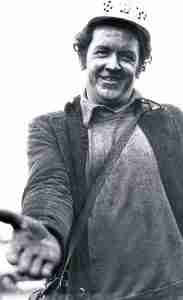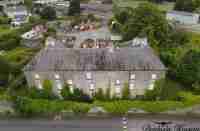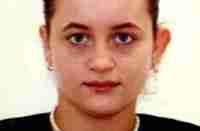Charlie Hopkins brought hope to his own people
 Good leaders set out not to lead, but to make a difference. Charlie Hopkins, who died on April 1st, was such a person.
Good leaders set out not to lead, but to make a difference. Charlie Hopkins, who died on April 1st, was such a person.
Twice chairperson of Roscommon County Council, Charlie Hopkins was famous as leader of the beleaguered Arigna miners. He used those positions to provide representation, remedies and renewed hope for a community that was in despair.
Life was tough around Lough Allen in the 1980s and ‘90s. When the Arigna Mines closed in 1990, 214 local people lost their jobs. The impact was devastating. By 1996, unemployment in the area was 64% – higher than anywhere else in Ireland – and 45% of affected workers had not been able to secure new jobs.
He leaves an extensive legacy. As a politician in the ‘90s and 2000s, Charlie Hopkins secured resources that led to new employment and renewed hope underneath the Iron Mountains. Arigna Fuels employs 55 people today. The Arigna Mining Experience is now a busy tourist attraction. The O’Carolan Harp Festival is a national event. Keadue was, uniquely, national winner of Ireland’s Tidy Towns competition twice during his political tenure.
Earlier, as a union leader in the ‘70s and ‘80s, Charlie Hopkins achieved improved working conditions for miners at a time when ‘Stardust Ireland’ didn’t place much emphasis on health & safety for workers. Recently, as an activist in the National Coalminers Group, he secured recognition and supports for ex-miners who are afflicted by diseases caused by working underground for long periods.
Frenchpark’s John Connor, Dáil Deputy for Roscommon in the ‘80s and 90’s, introduced Charlie Hopkins to Fine Gael. Mr. Hopkins was a Fine Gael county councillor from 1991-2009 and continued to be active in his party until his death.
As a politician, he enjoyed remarkably strong local support, regularly polling more than 70% in polling stations in Arigna, Ballyfarnon, Keadue and Corrigeenroe. He had good intelligence, understood clearly the financial circumstances of local households, and was well liked. He had excellent political judgement and a strong political organisation in North Roscommon.
Charlie Hopkins was a dealer in hope. Those who wish to understand the scale of Arigna’s economic and social problems in that grey era should read Denise McMorrow’s excellent “Is there light at the end of the tunnel” 1998 paper, which is available online.
Terry Leyden crosses line of 46-year political marathon
Congratulations to Terry Leyden, who retires this spring after a 46-year political career that spanned 16 years in in Dáil Éireann, 22 years on Roscommon County Council, 18 years in Seanad Éireann and tenures in two ministerial departments.
Democracy in an independent Ireland began in 1922, 98 years ago. Terry Leyden, in public life for almost half of the time that has passed since then, must be regarded as a pillar of democratic politics in our country. He is a living link to a distant past.
Stamina, optimism and colour are some of his notable political characteristics. His political career has been sustained also by the support of his wonderful wife Mary and his loyal family. His courtesy, generosity and good humour are valued by all who know him. He believes deeply in Fianna Fáil, and he respects other views. The Leydens are a nice family.
An hour with him in the family’s Castlecoote Lodge is always enjoyable and educational. Wishing Terry and Mary many happy years.
Decline of big parties – Irish democracy will be different now
Tommy Waldron – a famous Athleague hurler in his youth and nowadays a familiar figure around Roscommon town and local farming circles – taught civics (CSPE – civic, social & political education) to junior cert students at Roscommon CBS around the time of the dawn of the new millennium.
Delivering one lesson in an upstairs classroom that overlooks Abbeytown and the Dublin-Westport railway line, he talked about Ireland’s two-and-a-half party political system (FF, FG, Lab). Mr. Waldron explained, that in western democracies, “major” parties gather voter interests and translate those interests into cross-cutting policies that serve the common good.
The recent Irish general election proves that, 20 years after Mr. Waldron’s classroom lesson, Ireland doesn’t have major, ‘big’ political parties anymore.
People in this country are using a kind of meitheal consciousness to confront the unfolding Covid-19 crisis. This collective action feels very reassuring. It is an Irish response to a global problem.
Multiple small political groupings, each representing a small share of the Irish people, means that in future our Dáil may be less collective in its work.
Whatever the future holds, let’s hope that voters and politicians will value consensus and the common good, over sectional interest. Ní neart go cur le chéile – there is no strength without unity.
Creggs people everywhere should be proud of Conor Connelly
The sudden death of Conor Connelly has shocked and distressed many people.
I grew up 3km from Creggs village. I am 10 years younger than Conor Connelly. As children growing up on a local farm in the 1990s, we used to love to go with our father to Jimmy Connelly’s garage on a Saturday.
My father would need to buy shear pins, a grease cartridge, or a drum of engine oil or whatever. We, as children, relished the chance to meet and chat with the famous footballers, older than us, who worked hard in that garage for their father.
In those years Conor Connelly, with his impish looks and personality, was making national headlines as an exciting footballer for Roscommon and UCD. Conor’s brother Darragh is another great character who was a tremendous footballer also.
The GAA, in our locality back in the 1990s, did not have the resources or facilities that it has today. Conor Connelly was a source of pride, motivation and inspiration.
The Connelly family and Creggs people everywhere should be proud of him, his achievements and his impact.
Castlecoote man Paul Hickey (34) works as an economist in Ireland’s pharmaceutical industry. He is a former employee of the Roscommon People and has a keen interest in politics.






